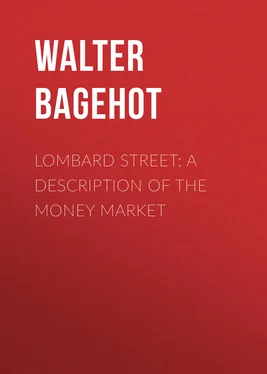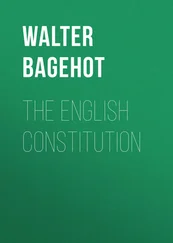Walter Bagehot - Lombard Street - A Description of the Money Market
Здесь есть возможность читать онлайн «Walter Bagehot - Lombard Street - A Description of the Money Market» — ознакомительный отрывок электронной книги совершенно бесплатно, а после прочтения отрывка купить полную версию. В некоторых случаях можно слушать аудио, скачать через торрент в формате fb2 и присутствует краткое содержание. Жанр: foreign_prose, История, foreign_edu, foreign_antique, на английском языке. Описание произведения, (предисловие) а так же отзывы посетителей доступны на портале библиотеки ЛибКат.
- Название:Lombard Street: A Description of the Money Market
- Автор:
- Жанр:
- Год:неизвестен
- ISBN:нет данных
- Рейтинг книги:4 / 5. Голосов: 1
-
Избранное:Добавить в избранное
- Отзывы:
-
Ваша оценка:
- 80
- 1
- 2
- 3
- 4
- 5
Lombard Street: A Description of the Money Market: краткое содержание, описание и аннотация
Предлагаем к чтению аннотацию, описание, краткое содержание или предисловие (зависит от того, что написал сам автор книги «Lombard Street: A Description of the Money Market»). Если вы не нашли необходимую информацию о книге — напишите в комментариях, мы постараемся отыскать её.
Lombard Street: A Description of the Money Market — читать онлайн ознакомительный отрывок
Ниже представлен текст книги, разбитый по страницам. Система сохранения места последней прочитанной страницы, позволяет с удобством читать онлайн бесплатно книгу «Lombard Street: A Description of the Money Market», без необходимости каждый раз заново искать на чём Вы остановились. Поставьте закладку, и сможете в любой момент перейти на страницу, на которой закончили чтение.
Интервал:
Закладка:
London bankers, other than the Bank of England, effect this in several ways. First, they have probably discounted bills to a large amount for the bill brokers, and if these bills are paid, they decline discounting any others to replace them. The directors of the London and Westminster Bank had, in the panic of 1857, discounted millions of such bills, and they justly said that if those bills were paid they would have an amount of cash far more than sufficient for any demand. But how were those bills to be paid? Some one else must lend the money to pay them. The mercantile community could not on a sudden bear to lose so large a sum of borrowed money; they have been used to rely on it, and they could not carry on their business without it. Least of all could they bear it at the beginning of a panic, when everybody wants more money than usual. Speaking broadly, those bills can only be paid by the discount of other bills. When the bills (suppose) of a Manchester warehouseman which he gave to the manufacturer become due, he cannot, as a rule, pay for them at once in cash; he has bought on credit, and he has sold on credit. He is but a middleman. To pay his own bill to the maker of the goods, he must discount the bills he has received from the shopkeepers to whom he has sold the goods; but if there is a sudden cessation in the means of discount, he will not be able to discount them. All our mercantile community must obtain new loans to pay old debts. If some one else did not pour into the market the money which the banks like the London and Westminster Bank take out of it, the bills held by the London and Westminster Bank could not be paid.
Who then is to pour in the new money? Certainly not the bill brokers. They have been used to re-discount with such banks as the London and Westminster millions of bills, and if they see that they are not likely to be able to re-discount those bills, they instantly protect themselves and do not discount them. Their business does not allow them to keep much cash unemployed. They give interest for all the money deposited with them—an interest often nearly approaching the interest they can charge; as they can only keep a small reserve a panic tells on them more quickly than on anyone else. They stop their discounts, or much diminish their discounts, immediately. There is no new money to be had from them, and the only place at which they can have it is the Bank of England.
There is even a simpler case: the banker who is uncertain of his credit, and wants to increase his cash, may have money on deposit at the bill brokers. If he wants to replenish his reserve, he may ask for it, suppose, just when the alarm is beginning. But if a great number of persons do this very suddenly, the bill brokers will not at once be able to pay without borrowing. They have excellent bills in their case, but these will not be due for some days; and the demand from the more or less alarmed bankers is for payment at once and to-day. Accordingly the bill broker takes refuge at the Bank of England the only place where at such a moment new money is to be had.
The case is just the same if the banker wants to sell Consols, or to call in money lent on Consols. These he reckons as part of his reserve. And in ordinary times nothing can be better. According to the saying, you 'can sell Consols on a Sunday.' In a time of no alarm, or in any alarm affecting that particular banker only, he can rely on such reserve without misgiving. But not so in a general panic. Then, if he wants to sell 500,000 L. worth of Consols, he will not find 500,000 L. of fresh money ready to come into the market. All ordinary bankers are wanting to sell, or thinking they may have to sell. The only resource is the Bank of England. In a great panic, Consols cannot be sold unless the Bank of England will advance to the buyer, and no buyer can obtain advances on Consols at such a time unless the Bank of England will lend to him.
The case is worse if the alarm is not confined to the great towns, but is diffused through the country. As a rule, country bankers only keep so much barren cash as is necessary for their common business. All the rest they leave at the bill brokers, or at the interest-giving banks, or invest in Consols and such securities. But in a panic they come to London and want this money. And it is only from the Bank of England that they can get it, for all the rest of London want their money for themselves.
If we remember that the liabilities of Lombard Street payable on demand are far larger than those of any like market, and that the liabilities of the country are greater still, we can conceive the magnitude of the pressure on the Bank of England when both Lombard Street and the country suddenly and at once come upon it for aid. No other bank was ever exposed to a demand so formidable, for none ever before kept the banking reserve for such a nation as the English. The mode in which the Bank of England meets this great responsibility is very curious. It unquestionably does make enormous advances in every panic
In 1847 the loans on 'private securities'
increased from 18,963,000 L to 20,409,000 L
1857 ditto ditto 20,404,000 L to 31,350,000 L
1866 ditto ditto 18,507,000 L to 33,447,000 L
But, on the other hand, as we have seen, though the Bank, more or less, does its duty, it does not distinctly acknowledge that it is its duty. We are apt to be solemnly told that the Banking Department of the Bank of England is only a bank like other banks—that it has no peculiar duty in times of panic—that it then is to look to itself alone, as other banks look. And there is this excuse for the Bank. Hitherto questions of banking have been so little discussed in comparison with questions of currency, that the duty of the Bank in time of panic has been put on a wrong ground.
It is imagined that because bank notes are a legal tender, the Bank has some peculiar duty to help other people. But bank notes are only a legal tender at the Issue Department, not at the Banking Department, and the accidental combination of the two departments in the same building gives the Banking Department no aid in meeting a panic. If the Issue Department were at Somerset House, and if it issued Government notes there, the position of the Banking Department under the present law would be exactly what it is now. No doubt, formerly the Bank of England could issue what it pleased, but that historical reminiscence makes it no stronger now that it can no longer so issue. We must deal with what is, not with what was.
And a still worse argument is also used. It is said that because the Bank of England keeps the 'State account' and is the Government banker, it is a sort of 'public institution' and ought to help everybody. But the custody of the taxes which have been collected and which wait to be expended is a duty quite apart from panics. The Government money may chance to be much or little when the panic comes. There is no relation or connection between the two. And the State, in getting the Bank to keep what money it may chance to have, or in borrowing of it what money it may chance to want, does not hire it to stop a panic or much help it if it tries.
The real reason has not been distinctly seen. As has been already said—but on account of its importance and perhaps its novelty it is worth saying again—whatever bank or banks keep the ultimate banking reserve of the country must lend that reserve most freely in time of apprehension, for that is one of the characteristic uses of the bank reserve, and the mode in which it attains one of the main ends for which it is kept. Whether rightly or wrongly, at present and in fact the Bank of England keeps our ultimate bank reserve, and therefore it must use it in this manner.
And though the Bank of England certainly do make great advances in time of panic, yet as they do not do so on any distinct principle, they naturally do it hesitatingly, reluctantly, and with misgiving. In 1847, even in 1866—the latest panic, and the one in which on the whole the Bank acted the best—there was nevertheless an instant when it was believed the Bank would not advance on Consols, or at least hesitated to advance on them. The moment this was reported in the City and telegraphed to the country, it made the panic indefinitely worse. In fact, to make large advances in this faltering way is to incur the evil of making them without obtaining the advantage. What is wanted and what is necessary to stop a panic is to diffuse the impression, that though money may be dear, still money is to be had. If people could be really convinced that they could have money if they wait a day or two, and that utter ruin is not coming, most likely they would cease to run in such a mad way for money. Either shut the Bank at once, and say it will not lend more than it commonly lends, or lend freely, boldly, and so that the public may feel you mean to go on lending. To lend a great deal, and yet not give the public confidence that you will lend sufficiently and effectually, is the worst of all policies; but it is the policy now pursued.
Читать дальшеИнтервал:
Закладка:
Похожие книги на «Lombard Street: A Description of the Money Market»
Представляем Вашему вниманию похожие книги на «Lombard Street: A Description of the Money Market» списком для выбора. Мы отобрали схожую по названию и смыслу литературу в надежде предоставить читателям больше вариантов отыскать новые, интересные, ещё непрочитанные произведения.
Обсуждение, отзывы о книге «Lombard Street: A Description of the Money Market» и просто собственные мнения читателей. Оставьте ваши комментарии, напишите, что Вы думаете о произведении, его смысле или главных героях. Укажите что конкретно понравилось, а что нет, и почему Вы так считаете.












